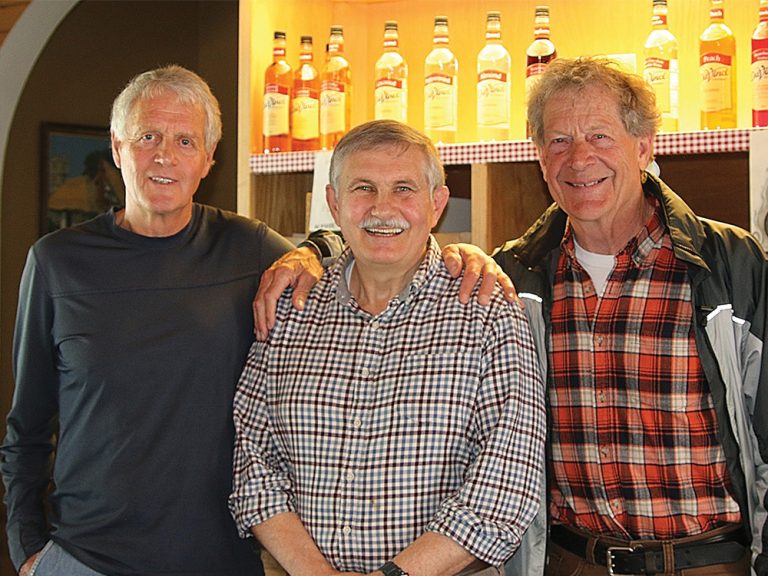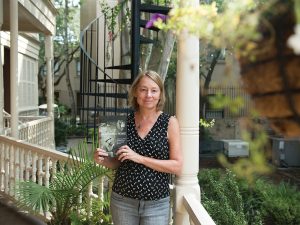 Farrell Examines War-Related Fiction
Farrell Examines War-Related Fiction
Susan Farrell ’85, a member of the English faculty at the College of Charleston, says that even seasoned writers have grappled with the difficult task of putting devastating events into words, and her latest book, Imagining Home: American War Fiction from Hemingway to 9/11, provides a critique of popular war fiction. Events of September 11, she says, are often referred to as “unspeakable,” and she has found in her teaching that American writers have been similarly concerned with “the inadequacy of ordinary words to describe war and wartime trauma.”
She uses her new book as a platform to forge a connection between 20th- and 21st-century American war fiction by looking through two different lenses. Her own interest in 9/11-based literature was the impetus behind this re-evaluation of war fiction that she deems not only as beyond description but also gendered with stiff male and female stereotypes, highly detectable in both eras of literary fiction.
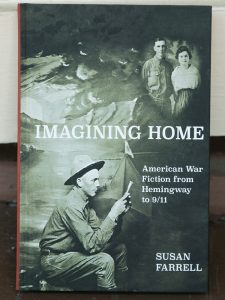 “The American war writers I examine in my book show male characters who struggle with conventional expectations of masculine courage and camaraderie, and who, above all, long for home in the midst of war. But traditional ideas about home and domesticity turn out to be illusions as well—homes are not safe havens in the world of war, completely separate from the frontlines, and women are neither innocents to be protected nor nurturers whose job is to replenish men spiritually.”
“The American war writers I examine in my book show male characters who struggle with conventional expectations of masculine courage and camaraderie, and who, above all, long for home in the midst of war. But traditional ideas about home and domesticity turn out to be illusions as well—homes are not safe havens in the world of war, completely separate from the frontlines, and women are neither innocents to be protected nor nurturers whose job is to replenish men spiritually.”
Susan joined the College of Charleston faculty in 1993 after completing her master’s degree and Ph.D. at the University of Texas at Austin. She teaches courses in American literature, contemporary fiction, women’s studies, and composition. She has recently published books on Kurt Vonnegut and Tim O’Brien.
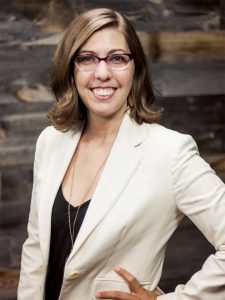 Hardy Takes on Harvey Using Her Brain
Hardy Takes on Harvey Using Her Brain
When Hurricane Harvey made landfall in Texas last August, people pulled together to render aid and send financial support. Annie Hardy ’02 lives in Cedar Park, Texas, more than 200 miles from the flooding, but raised in Dickinson, Texas, she had many friends in the flood zone. So, that first Sunday morning as waters were rising, she awoke to a social media feed filled with alarming messages and photos from friends. “On the rooftop with my three sons waiting for rescue. Lord, please be with me and my sons,” one friend posted.
“When I matriculated at Austin College, they used a phrase on our T-shirts: ‘God gave us brains, and He expects us to use them,’” Annie said. “And, faced with those photos, those stories, of people I knew and grew up with, who were scared and in danger, I did what I knew to do. I hustled. The internet has equipped hustle like never before. We have access to friends and connections across the world.”
Annie jumped to action, using her phone, computer, and connections across Texas. She contacted friends with boats to help in rescue efforts; confirmed clear paths to leave the area; connected evacuees with those offering shelter; facilitated direct donations to people needing food, gas, shelter, or information; and managed a supply chain of cleaning supplies and construction materials to the hardest-hit areas. As the most immediate needs were met, she turned her efforts to researching and promoting nonprofit organizations that would put the majority of funds given toward helping the community, connecting people with places to donate goods and services, and sending supplies to homes via cars that were headed in that direction.
Annie has returned to her work as principal and managing director of Zeet Consulting, specializing in research and data strategies for businesses, but she has not forgotten the victims of Harvey. She reminds friends and family to continue to make donations and meet the needs that arise, as well as travel to the coast to help rebuild homes in the devastated communities. “There is much work to be done, and we as Fighting Kangaroos can continue to pour our love and resources into these cities and these families over the coming year. I’ve learned there is much help we can give, even from the comforts of home.”
God gave her a brain. Annie plans to use it to help wherever she can.
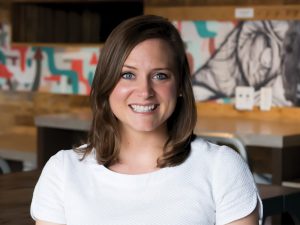 Leading the Way in Healthcare
Leading the Way in Healthcare
Katherine Yarbrough Kuzmeskas ’07 was named by Forbes magazine as one of “34 Leaders Who Are Changing Healthcare.” As the founder and CEO of SimplyVital, Kat works to harness blockchain to improve inefficiencies in medical record keeping and payment methods. Blockchain is a way to track information history that can never be deleted. It is essentially a database that maintains a continuously growing list of records or transactions. The information then can be shared among health professionals using value-based care where reimbursements are based on outcomes and cooperative use of medical records benefits the patient and provider.
While working as a strategic planner at Yale New Haven Health, she recognized a weakness in the information and billing practices. Her own need to create and her desire to find a startup opportunity in the healthcare field led her to research, revise, and pitch the idea behind SimplyVital.
Since its beginning in the spring of 2016, SimplyVital has been recognized as a game changer in healthcare management. They have hired employees and sales staff, and gained valuable investors.
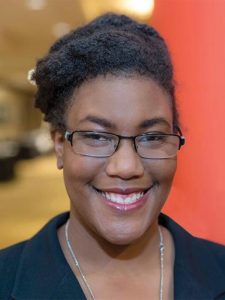 A Winning Account of a Wonderful Opportunity
A Winning Account of a Wonderful Opportunity
Shardae White ’16 studied abroad in Valparaiso, Chile, for the 2014-2015 academic year as a Gilman Scholar. When the Institute of International Education (IIE) put out a call to its study abroad alumni to share their experiences, Shardae answered, creating a video about her time in Chile for the IIE Voices Video Challenge.
Her work was selected as one of two national winners, and she was awarded a trip to Washington, D.C., to attend the IIE Summit on Generation Study Abroad in October 2017 as a “Generation Study Abroad Voices” ambassador.
“I wanted to show non-traditional and under-represented students that they can go abroad and have an experience that’s unique to them, because oftentimes we’re bombarded with the same kind of narrative about study abroad, and I really do believe representation matters,” she said. “I think my experience abroad helped me professionally because I gained confidence in my skills, perspective, and unique insight I can contribute.” Shardae works as a weekend supervisor in Abell Library on campus.
At www.iie.org, search Voices Video Challenge and scroll down to see Shardae’s winning video.

